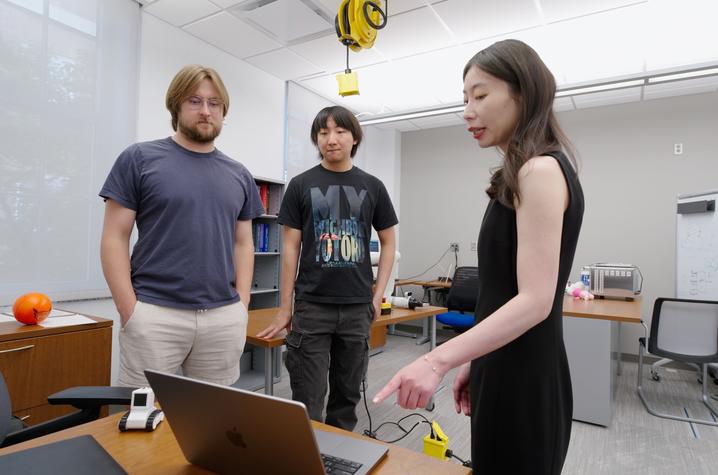NSF CAREER Award fuels UK researcher’s breakthroughs in robotics
LEXINGTON, Ky. (Oct. 6, 2025) — A University of Kentucky researcher is working to make human-robot collaboration safer and more reliable in complex and extreme environments.
Biyun Xie, Ph.D., assistant professor in the Department of Electrical and Computer Engineering at the Stanley and Karen Pigman College of Engineering, has received a prestigious U.S. National Science Foundation (NSF) CAREER Award to advance research in human-robot shared control for robotic telemanipulation.
Telemanipulation involves controlling how a robot interacts with its environment from a distance.
Xie’s early fascination with robotics was inspired by animated films and strengthened through interactive learning that transformed her curiosity into a dedicated research career.
“I had a strong interest in robotics because of robot movies such as ‘WALL-E’ and ‘Big Hero 6,’” Xie said. “I thought these robots, WALL-E, EVE and Baymax, were so cute, and they have strong emotions, like humans. When I was an undergraduate student, I also had the opportunity to work in a robotics lab.”
The CAREER Award focuses on developing technology that enables robots and human operators to work together in situations too dangerous or remote for humans alone.
“We all know that robots are capable of operating in environments where it is impossible for humans to be physically present, such as deep oceans and radioactive environments,” Xie said. “Shared control, between full autonomy and manned operation, allows a human operator and autonomous controller to jointly control the robot together.”
Reliability is a central challenge that Xie’s research seeks to address, focusing on developing systems that can perform consistently and effectively in real-world conditions.
“We know that space robotic arms are commonly used to collect or transfer samples in a robotic plan array, but space exploration presents significant challenges to their reliability and robustness because of the extreme low or high temperatures and the high radiation levels on some planets,” Xie said. “Unfortunately, reliability of shared control remains an open research problem that limits the practical applications of these robotic teleoperation techniques.”
Xie and her team will collaborate with two local high schools to offer lectures, demonstrations and research experiences, and will also provide opportunities for undergraduates through UK’s ECE Undergraduate Research Program.
“The educational goal of this NSF CAREER Award is to broaden participation in STEM through providing research mentorship and establishing role models,” she said.
Looking to the future, Xie encourages young people to pursue robotics and STEM fields.
“This is a hot research area and many people are working on developing very fascinating techniques,” Xie said. “For young students, I think the first thing is they need to learn math very well. This is a very important foundation to do good research in robotics.”
The CAREER Award is one of the “most prestigious awards in support of the early career-development activities of those teacher-scholars who most effectively integrate research and education within the context of the mission of their organization,” according to NSF.
This material is based upon work supported by the U.S. National Science Foundation under Award Number 2441654. Any opinions, findings, and conclusions or recommendations expressed in this material are those of the author(s) and do not necessarily reflect the views of the U.S. National Science Foundation.


As the state’s flagship, land-grant institution, the University of Kentucky exists to advance the Commonwealth. We do that by preparing the next generation of leaders — placing students at the heart of everything we do — and transforming the lives of Kentuckians through education, research and creative work, service and health care. We pride ourselves on being a catalyst for breakthroughs and a force for healing, a place where ingenuity unfolds. It's all made possible by our people — visionaries, disruptors and pioneers — who make up 200 academic programs, a $476.5 million research and development enterprise and a world-class medical center, all on one campus.




